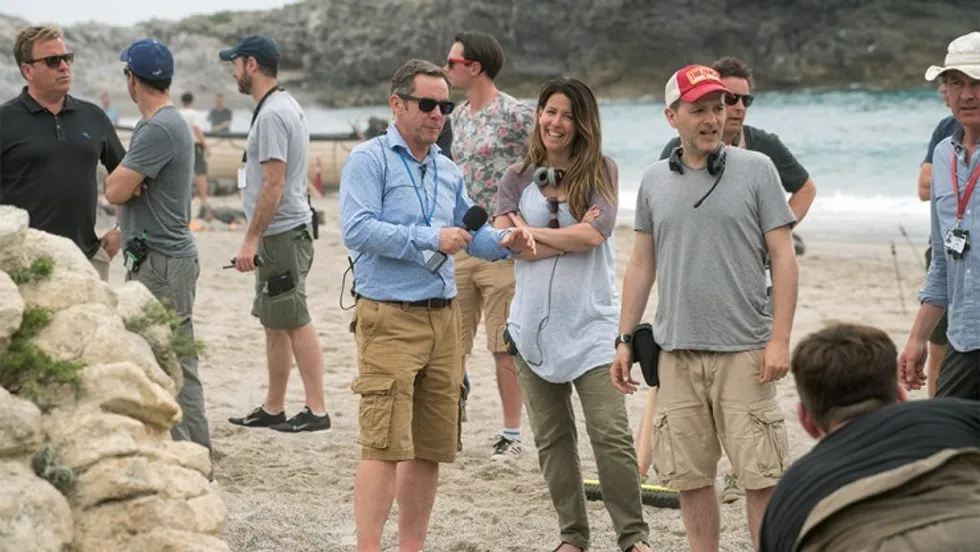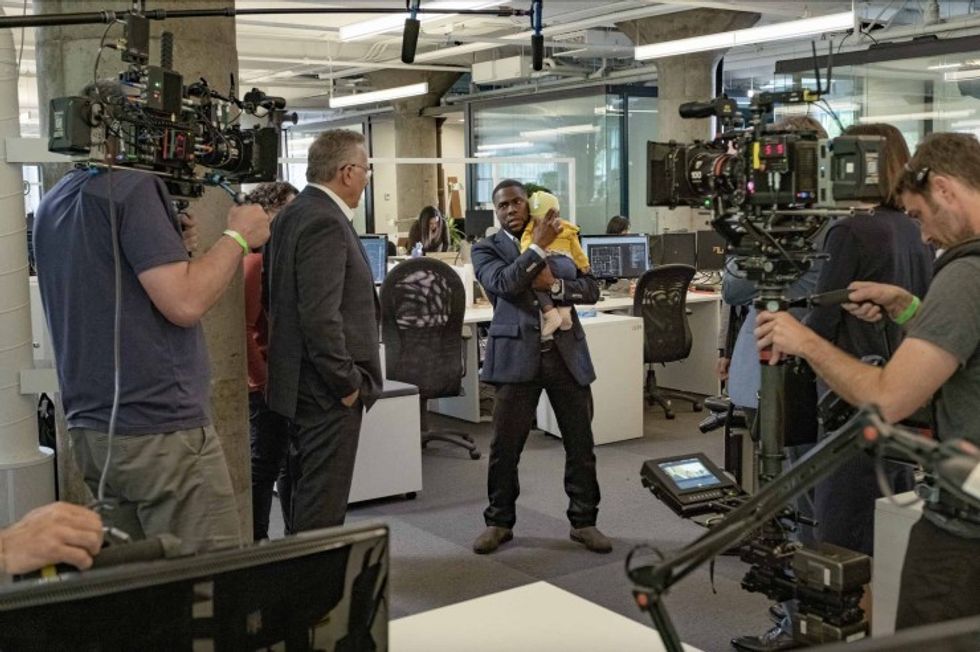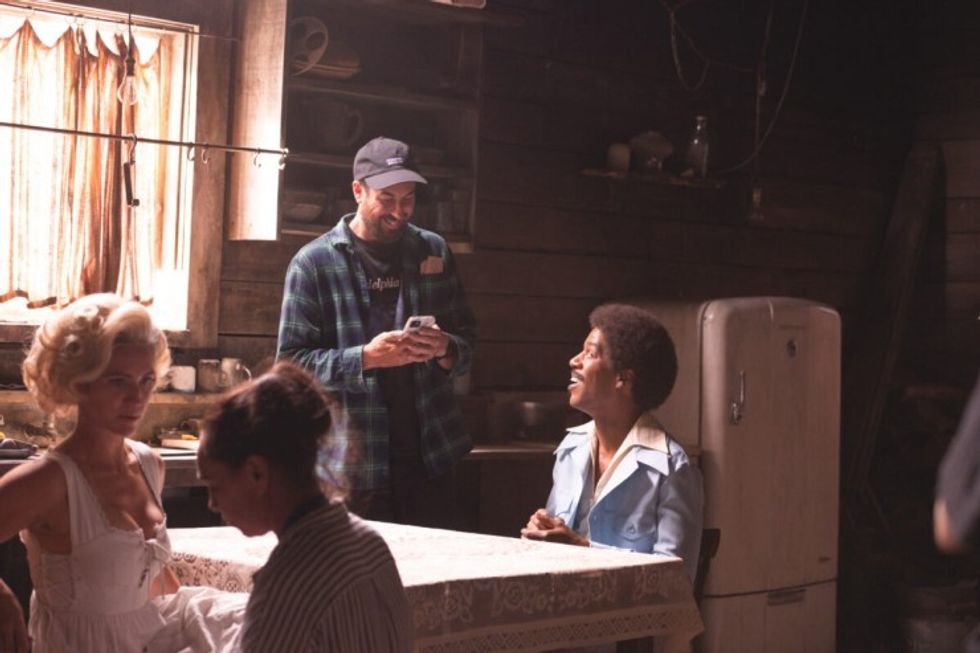What Does a Production Assistant Do?
Do you know what a production assistant does? Or how much they make? We have the answers.

What Does a Production Assistant Do? And How Much Do They Make?
So you want to get into the film business, but have no idea where to start? Well, many people start as production assistants. I know I did.
They can be the first job you get, and they're a position where you don't need much experience to start. But what exactly do production assistants do? And how much can you expect to make?
Today, I want to go over the job of the production assistant and talk about how important they are on set and how valuable your time working as one can be if you can get your foot in the door. And if you have other questions about film crew jobs, check out our breakdown of every job on set.
Ready? Let's jump in.

What Does a Production Assistant Do?
Hollywood is full of jobs that people outside the industry have never thought about. But to make movies and TV shows, hundreds if not thousands of people have to be employed.
The very lowest on the totem pole is the humble production assistant, or PA. Without them, nothing would ever happen.
What Is a Production Assistant?
A production assistant, also known as a PA, is a member of the crew on a film and TV show. They are entry-level jobs on set, reserved for people who are breaking into the industry.
The job of a PA is different based on the specific needs of the set and the size of the production. It also matters whether or not the production you're on is union or not, because the union can guarantee you more pay and better-defined roles.
There are times when specific PAs are attached to the filmmaker or actors and help them out as individuals as well.

What Does a Production Assistant Do on Set?
Your job as a PA will vary depending on the size of the budget as well as your relative experience on set. More experienced production assistants might be helping the director or writer exclusively. Someone new might stand at the end of a road and make sure no one drives down it.
The basic job each PA has, no matter how experienced, is to help the 1st Assistant Director make sure that the production has everything it needs. That means you'll be doing tasks for pretty much every department. It's difficult to say exactly what you can expect to do on any given day, but suffice it to say you'll be doing everything and anything the 1st AD asks of you, whether that's moving things from point A to point B, wrangling cords, grabbing coffee, or setting up props.
If you're unsure how you should prepare for the job, check out these dozens of tips on how to prepare for your first PA gig.
What Are the Production Assistant Hours on Set?
PAs work very long hours. Their shifts are usually 12 hours but can go upwards of 16 hours, thanks to overtime. There are specific laws concerning how long you can work on set one day and what time you would have to report the next day. Make sure you learn what's legal in the place where you live and work.
For example, in North America, we currently do not have a PA union, but you might in Europe or Asia!

What Are the Different Kinds of PAs?
Every department has various PAs who work there. Let's look at a few.
- Office PAs: They spend hours in the production office handling such tasks as phones, deliveries, script copies, lunch pick-ups, and related tasks.
- Set PAs: These people work on set and facilitate the making of the TV show or movie.
- Post-production PAs: They work in an office where the editors do the cutting. They arrange schedules, organize work, and do admin tasks.
- Truck PAs: They drive equipment from place to place.
- Locations PAs: They lock down locations and limit access based on the needs of the location manager.
- Set Runner PAs: They cover general tasks off-set. They usually get sent to get coffee, lunches/dinners, stationary, or other items.
What Is a Production Assistant's Salary?
A PA starting salary is around $30-45K. But it is usually paid hourly, scaling out from $15 to $30 an hour.
Again, this is all determined by the size of the production and budget, as well as your specific job on the set. Many smaller jobs pay state minimum wage. This is a starting position, and it is a low salary. Hollywood is trying to do things to make this a better option for people starting out, but it can be hard to get these jobs and then live in an expensive city, like Los Angeles.

Production Assistant Resume
The more work you do in the industry, the more you'll fill out your resume. You can check out production assistant resume examples here.
You want to format these with the title of what you worked on, and then the year. Underneath, you can put bullet points with the tasks you completed. The more work you complete, the more experience you get. Soon, you could be the head PA or even be elevated to a different job on set.
We have seven tips for you to become the best PA there is!
Why Do You Want to Become a PA?
I truly think the best way to learn the film and TV industry from the inside out is to work entry-level jobs. You get to be a fly on the wall when it comes to how different people interact with one another. You also get to see every aspect of how movies and TV are made. Plus, chances are you might meet people with whom you can make your own movies and TV, or people who can introduce you to other people who can hire you. These insights will definitely affect how you do things later. It might even affect how you treat people on set.
So go get some experience, even if it is just for a short while!

Production Assistant Lingo
If you work on set, there's a whole bunch of new lingo you need to learn. Here are some examples of that we often hear as PAs on set.
- Comfortable shoes: This is the most crucial item for any film position. If you plan on having a career in this industry, invest wisely in comfortable, durable, waterproof, closed-toed, and non-slip footwear. Your feet will thank you.
- Appropriate clothing: The meaning of "appropriate" can vary depending on the set, but blacks are generally a safe bet. If you’re working on an upscale commercial with clients in attendance, make an effort to wear clothes that aren’t too ripped or stained. Always avoid controversial clothing or anything too revealing. If you’re going to be shooting outside, be sure your outfit takes the weather into account. (Bring sunscreen!) And always be sure that your pants have pockets and the wherewithal to support the weight of a walkie and whatever else you might be asked to hold. This means you need to skip the leggings.
- Surveillance: "Surveillance" is otherwise known as an earpiece for your walkie. Buy one. Keep track of it. Love it. Walkies are used on all professional sets, and surveillance is not always provided. When it is, it runs the risk of being broken or unsanitary. Either way, make sure you have one on you. An "open walkie" with the volume turned out to the public can be a quick way to ruin a take and get fired before lunchtime.
- Call sheets: The day’s call sheet is your first point of reference and a very important tool. It tells you where and when to be, and it acts as a guide for the whole day. Study it beforehand and note any necessary information. Print the call sheet at home and have extras on your person throughout the day, in case anyone asks for a copy. (You'll get brownie points for this.)
- Sides: These are the script pages your crew will be shooting that day. Depending on the shoot, these won’t always exist or be made available to you. But if they are, they’re another excellent reference for following what exactly is going on around you. It's the same principle as call sheets: print these at home and have extras available.
- Multitool: This is not mandatory and no one will expect you to have one, but you will certainly win points if you can solve a problem without asking to borrow a multitool from the G&E department.
- A small notepad and pen: You’re going to learn a lot on your first day. Taking notes can save you in any number of situations. Use it to remember directions so you don’t have to ask twice. Write down people’s names and positions and coffee orders. (You’d be surprised how important this one is—film crews don’t mess around with coffee.)
- Multiple phone chargers and external batteries: Having a charged smartphone is unquestionably necessary. A dead phone at the wrong time can be grounds for termination. Your own phone is your first priority, but if you can bring chargers for different models, everyone on set will thank you. Just don’t forget to label your stuff, or people could walk off with it.
- Extra socks: In case your feet get wet or cold. Miserable feet lead to a miserable day. Trust us.
- Lighter: Bring this, even if you don’t smoke. It could be your most powerful tool. It may be the reason you get to speak to the lead actor or DP. It may be the reason the Key PA hires you back the next day.
- Hot bricks and your walkie: When you get to set, go straight to the production area to get your walkie-talkie and extra charged batteries, or "hot bricks." Keep these items on you all day and hand out batteries to whoever may need them.
How to Become a Production Assistant
To become a production assistant, you need to apply for those jobs. There are lots of websites available that let you search for production assistant jobs.
I like Indeed, LinkedIn, Mandy, and Glassdoor for their ease of uploading a resume and for applying for many jobs at once. If you want to be a PA on a film set, you have to apply for a lot of jobs. Many people are competing to get into this business.
But where are some other places you should be looking?
Where to Find Production Assistant Jobs
If you live in California, I like looking for listings on the Film CA website. I'm also a big fan of Google Jobs, which aggregates from many different sources.
Another very popular site is Entertainment Careers, which only stocks jobs for people looking to work in the industry. And there is always Craigslist, but that almost always has much smaller PA jobs.
Aside from these sites, you should also tap into your contacts—do you know anyone who is working that can hire you? Check out Facebook or other social media groups as well. It's okay to tweet that you're looking for work.
Summing Up "What Does a Production Assistant Do and What Do They Make?"
Film production assistant jobs are not easy to find, but they are really great entry points of the industry. Hopefully, after reading this, you have a better idea of what they actually are and what they do all day. If you started as a PA, we want to hear from you. Put your wisdom and advice in the comments section below.
And let us know if you have any more questions about what it's like to be a PA in movies and TV!
- What You Should Never Do as an On-Set Production Assistant ›
- 7 Tips on How to Survive Being a Production Assistant ›
- Film Production Assistant Guide ›











